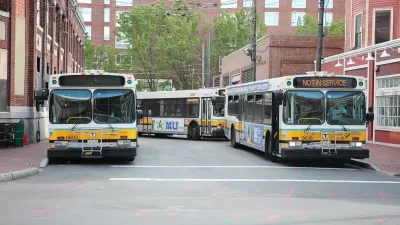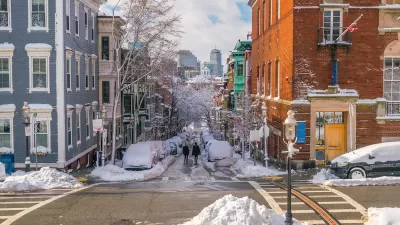The premise behind the energy benchmarking laws found in many cities is that they will induce owners to increase the efficiency of their buildings. But a new report questions whether the investment in data collection leads to changes in energy use.
A new report by a Harvard environmental economist questions energy efficiency benchmarking practices, which building owners often oppose, writes Elizabeth Daigneau.
The report argues that benchmarking, which requires that building owners track energy and water use in their buildings, does not account for individual resident use patterns and that low ratings can harm property values. Furthermore, the authors found no evidence "that these mandatory programs lead to any changes whatsoever in energy use.”
Commissioned by the Greater Boston Real Estate Board and the Building Owners and Managers Association, the report was produced in response to a new benchmarking ordinance in Boston, which would affect commercial properties larger than 25,000 SF and residential properties with more than 25 units.
Buildings account for the lion's share of greenhouse gas emissions in Boston, with 75 percent of building-related emissions coming from commercial and industrial operations.
The report is inconclusive on how benchmarking needs to be modified in order to ensure, rather than just track, building efficiency.
FULL STORY: Does energy benchmarking actually lead to more efficient buildings?

Study: Maui’s Plan to Convert Vacation Rentals to Long-Term Housing Could Cause Nearly $1 Billion Economic Loss
The plan would reduce visitor accommodation by 25,% resulting in 1,900 jobs lost.

North Texas Transit Leaders Tout Benefits of TOD for Growing Region
At a summit focused on transit-oriented development, policymakers discussed how North Texas’ expanded light rail system can serve as a tool for economic growth.

Using Old Oil and Gas Wells for Green Energy Storage
Penn State researchers have found that repurposing abandoned oil and gas wells for geothermal-assisted compressed-air energy storage can boost efficiency, reduce environmental risks, and support clean energy and job transitions.

San Mateo Formally Opposes Freeway Project
The city council will send a letter to Caltrans urging the agency to reconsider a plan to expand the 101 through the city of San Mateo.

A Bronx Community Fights to Have its Voice Heard
After organizing and giving input for decades, the community around the Kingsbridge Armory might actually see it redeveloped — and they want to continue to have a say in how it goes.

Houston Mayor Promises Dedicated Austin Street Bike Lane After Public Backlash
Although the one-way bike lane won’t be protected by physical barriers, the proposal is an improvement over the mayor’s initial plan to only include sharrows on the Austin Street project.
Urban Design for Planners 1: Software Tools
This six-course series explores essential urban design concepts using open source software and equips planners with the tools they need to participate fully in the urban design process.
Planning for Universal Design
Learn the tools for implementing Universal Design in planning regulations.
Borough of Carlisle
Caltrans
Heyer Gruel & Associates PA
Institute for Housing and Urban Development Studies (IHS)
City of Grandview
Harvard GSD Executive Education
Toledo-Lucas County Plan Commissions
Salt Lake City
NYU Wagner Graduate School of Public Service





























